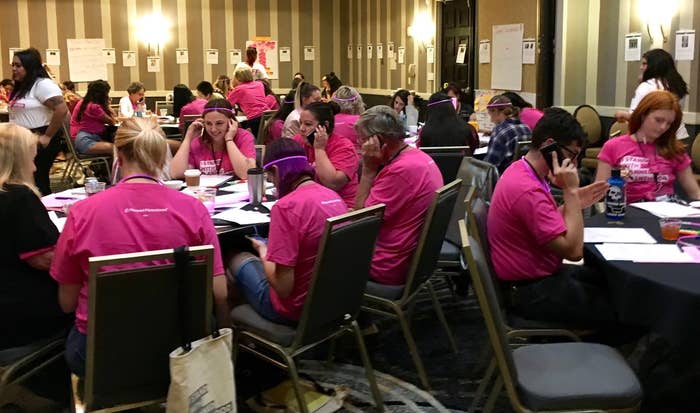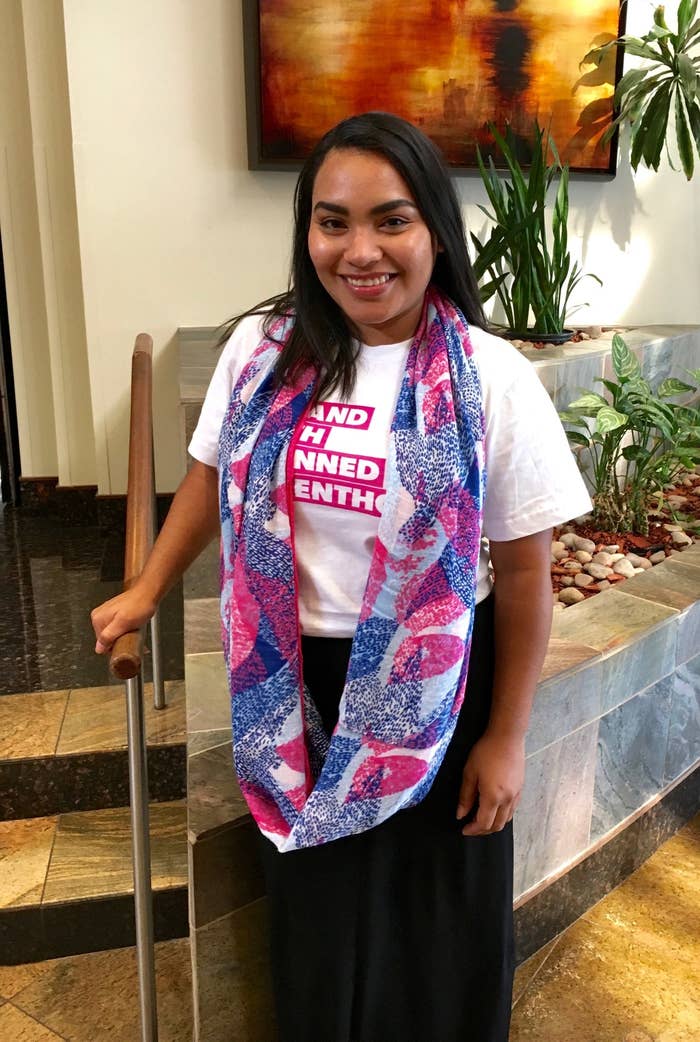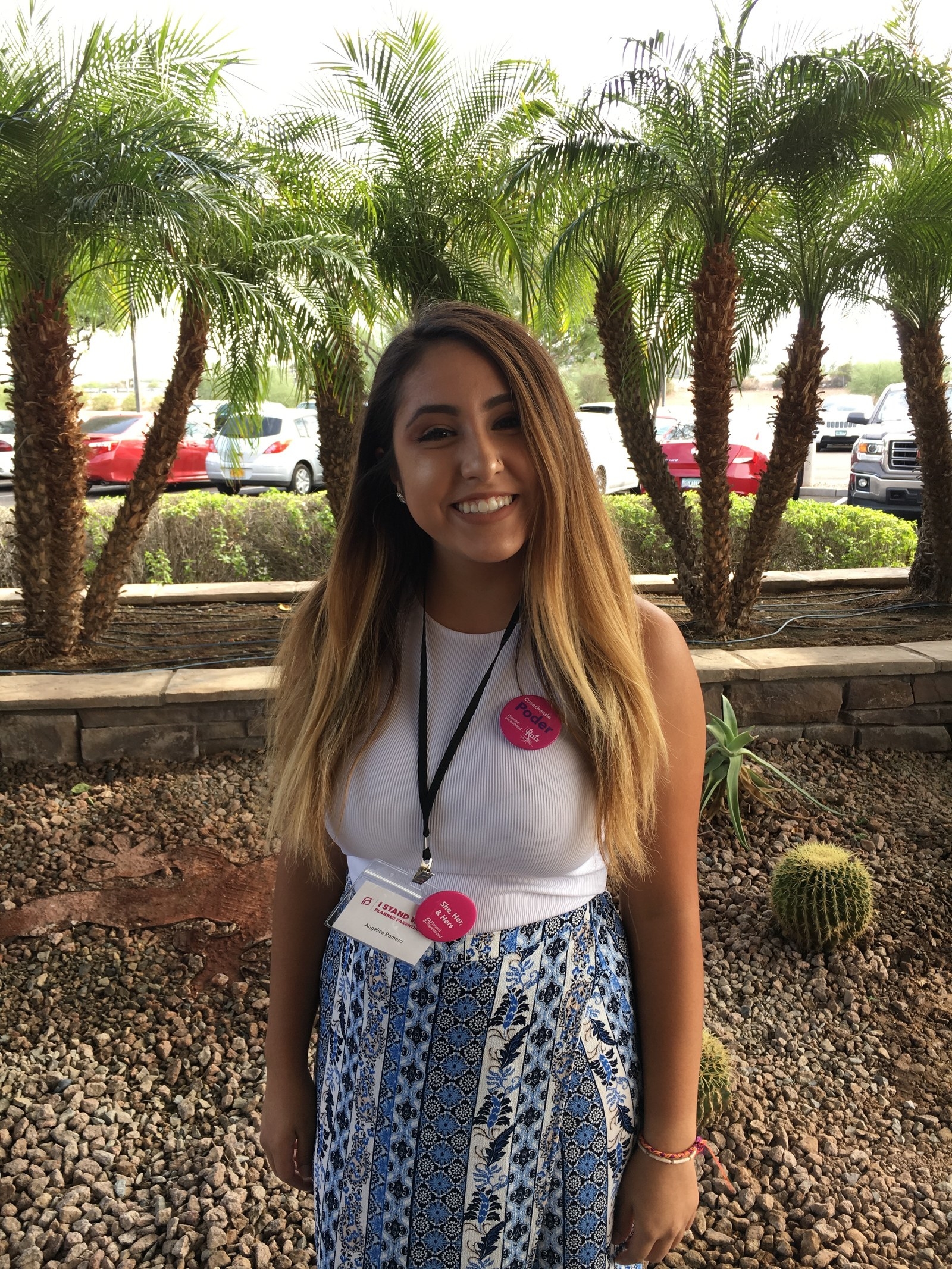
In a windowless hotel conference room in Phoenix, Arizona, Norma Jimenez stood before 140 Planned Parenthood volunteers, a majority of whom were white, and told them that she was a DACA recipient.
“I will try not to cry, but I’m being vulnerable with you all,” she told the rapt crowd.
“I came to this country from Durango, Mexico when I was one year old,” she said. “Up until I was applying for college, I had never even heard of a social security number.”
Jimenez, 26, is now a professional organizer for Planned Parenthood’s Latino outreach program, Raíz (“root” in Spanish). Just days before she was going to help lead the first of Planned Parenthood’s national summits to train volunteers for the 2018 elections, Attorney General Jeff Sessions announced that the Trump administration would rescind the Deferred Action for Childhood Arrivals (President Obama’s 2012 initiative temporarily protecting some immigrants who arrived in the US as children from deportation).
This very program enabled Jimenez to get her education, get a job with Planned Parenthood, and remain in the country she grew up in. But instead of staying behind to fight against President Donald Trump’s decision on DACA alongside immigration activist groups, she chose to stick with the health care organization.
The event at which Jimenez shared her story was a three day #IStandWithPP Southwest Organizing Summit, the first of a series of “bootcamps” to train the future leaders Planned Parenthood’s 600 organizing “armies” centered around each of their clinics.
Initially the conference was to be focused on the campaign the name implied: preventing Congress from defunding Planned Parenthood and repealing Obamacare. But after Sessions made his announcement, the focus shifted to DACA.
“The directive shifted because we know that our communities are scared they’re in danger,” Raquel Cruz-Juarez, a Planned Parenthood organizer from Nevada, told BuzzFeed News. She and other organizers said that leading up to the conference, many of their volunteers expressed concerns about DACA, and asked how they could help.
The organizers told BuzzFeed News that addressing DACA at the summit was a “no brainer.”
“This is a way of showing that we actually do this work, that we’re not just talking about being allies, we actually are allies,” Cruz-Juarez said. “We knew it was important for us to change our focus because once again, these are our people.”
So Planned Parenthood staff scrambled to change the action of the summit at the last minute, typing up new scripts for the one-hundred-plus volunteers to read over the phone to strangers. Instead of asking them to fight against the GOP’s attempts to repeal the Affordable Care Act, they were now asking them to call Arizona Sens. Jeff Flake and John McCain to ask them to support legislation to protect DACA recipients.
Immigration might seem a bit out of Planned Parenthood’s wheelhouse, but the many Latino organizers at the summit begged to disagree.
“Millions of people that we serve in our health centers are immigrants themselves, are undocumented, or have mixed status families,” Cruz-Juarez told BuzzFeed News. Even our own staff is going through this.”
Planned Parenthood does not ask for any documentation from its patients and organizers say undocumented people they know see Planned Parenthood as safe place for them to go. The states represented at the summit — as well as the state they were in — have some of the highest Hispanic and undocumented populations in the country: Arizona, Nevada, Texas, and California. Besides Jimenez, a handful of other people present at the summit were DACA recipients, and many others have undocumented family members.
“Our communities are scared, they’re in danger,” Cruz-Juarez said. “For Planned Parenthood to not take a stand on this would be standing on the wrong side of history.”

Despite the shift in the focus of the summit, all of the women who spoke to BuzzFeed News expressed some misgivings and guilt about choosing to be with Planned Parenthood during this time instead of their communities.
“Sometimes I feel like I shouldn’t be here,” Jimenez told BuzzFeed News, tears coming to her eyes, saying that a lot of her friends are at events and protests specifically addressing immigration and DACA, instead of health care.
“Sometimes I’m like, I should be there with them. But I’m here because this work is important to me,” she said, adding that her Planned Parenthood volunteers and fellow organizers became a support system for her this weekend, constantly checking in with her and making sure she’s alright and has enough food.
There’s a historical context to that anxiety as well. Many groups led by women of color that focused on “reproductive justice” (the marriage of reproductive rights with socioeconomic movements) have traditionally felt left out of the the most visible, and dominantly white-led, reproductive rights organizations such as Planned Parenthood and NARAL. In recent years, Planned Parenthood has made a concerted effort to change that perception, working to educate their supporters on the intersection of reproductive issues with socioeconomic and racial issues, joining up with reproductive justice groups led by women of color, and, after the 2016 elections, asking those groups to take the lead in organizing.
Many of the group conversations and personal “story sharing” from volunteers at the summit last weekend were focused on educating more privileged volunteers present about the problems facing immigrant communities in their states.
“I didn’t even know what DACA was before I came here, my whole family’s white,” Nicole Pate, 19, told BuzzFeed News. “But when I started hearing about it, I was like, how could they do this to people?”
“Sometimes I’m like, I should be there with them. But I’m here because this work is important to me.”
The Raíz organizers argued throughout the weekend that for immigrant communities there is a direct connection between immigration laws and Planned Parenthood.
Three Raíz organizers told BuzzFeed News that their undocumented family members were resistant to receive any official health care out of fear of turning over any official information about themselves, on top of the expense and language barriers.
“Health care is very, very important in the undocumented community,” Angelica Romero, a 19-year-old campus organizer at Arizona State University told BuzzFeed News. Her older sister is a DACA recipient, as are many of the students she works with on campus, and her father is undocumented.
“My dad has never visited an actual doctor,” Romero said. “And the only affordable health care my sister can attend is Planned Parenthood. … She’s said Planned Parenthood is the only place she feels comfortable.” Other clinics that ask for insurance and other documents make her feel uncomfortable and unwelcome, Romero said.
Jimenez echoed this concern, saying that her grandmother used to create home remedies for all her illnesses instead of going to a health center. The Arizona and Nevada volunteer groups also presented this is as a major health care problem in their states.
The Raìz organizers said that many of the undocumented immigrants they know trust Planned Parenthood not to put them in danger of deportation. Some of this has to do with the availability of Spanish language services in some primarily Spanish-speaking communities, such as the bilingual Maryvale Planned Parenthood health clinic in south Phoenix, which is majority Latino. The clinic does not perform abortions, but, according to The Arizona Republic, it remains one of the busiest Planned Parenthood clinics in the state, serving about 6,400 patients a year.
Many health clinics and doctors in areas with high Latino populations say that threats of crackdowns on immigrant communities often cause a drop in patient attendance, though Planned Parenthood said they do not keep track of these numbers.
In Arizona, Jimenez said, raids like the ones that former Maricopa County Sheriff Joe Arpaio would order often caused undocumented people not to want to leave their homes for health care or any other reason. She said this also takes a mental toll on not only undocumented immigrants, but also their children. That assertion is supported by multiple medical studies, which argue that immigration protections like DACA can help improve mental health for undocumented people and their children, though the same studies say there was no overall difference in physical health between DACA and non-DACA immigrants.
For Jimenez, Sessions’ announcement was the second of what felt like personal affronts to she and her family over the past month.
The first was another decision by Trump — to pardon Arpaio in a speech in Jimenez’s hometown. Jimenez, who had been involved in the successful Bazta Arpaio campaign to oust the sheriff known for extreme racial profiling and other alleged police misconduct, she protested outside.
“It was a slap in the face,” Jimenez said.

All three women grew visibly emotional when talking about listening to Sessions’ speech announcing the coming end of DACA. Jimenez and Cruz-Juarez were gathered in a room with fellow organizers. They described the silence that followed the announcement, the wordless support and solidarity they all felt as they cried and hugged. Romero was on her own, and when she heard the news on TV she sat in her bedroom and cried as well.
Romero’s mother came to America on a green card before Romero or her older sister was born, hoping they would grow up as citizens of the United States. A month before she was supposed to give birth to the first of her daughters, her own mother fell ill and she had to rush back to Mexico to be there for her death. So Romero’s sister was born in Mexico, a month before her due date, preventing the US citizenship her mother was planning for her.
“Sometimes I feel guilty,” Romero said. “Even though I’m doing all these trainings and am involved in this community, I feel guilty that my sister is struggling, and sometimes I don't know what to do.”
When the DACA announcement was made, Romero said she felt “very helpless and hopeless and like I just didn't know how to approach her.”
But her sister told her that she lived without DACA before, and she can do it again.
It is this knowledge of the “luck” of her citizenship, that helps to drive Romero’s activism, she said, crying. And her fellow community organizers have been a resource for her family, helping them call their members of Congress. They recently found out, to their relief that her sister’s DACA status was successfully renewed just in time; she will be able to finish college before her status is up.
“Sometimes I feel so guilty that it empowers me to do the work that I do,” she said, adding that despite her personal concerns in the immediate aftermath of DACA, Planned Parenthood has done so much for her and other families, she felt she owed it to the organization and her community to be at the summit and help train with the volunteers.
“The fight is not over,” she said her sister told her before coming to the summit. “But there’s people like you who are going to help us get our rights back.”
Planned Parenthood’s volunteer trainings like the one in Phoenix will also happen in Oklahoma City, Seattle, and Charlotte, North Carolina, training a total of around 1,000 volunteer leaders. These trained volunteers will go back to their states and form 600 “action councils” centered around each of Planned Parenthood’s health centers.
At first they will focus on issues directly affecting their communities — like accessibility to Planned Parenthood clinics, lack of sex education in their schools, and less obvious issues for the organization, like DACA — and by the time the 2018 elections come around they hope to already have a large, trained base of volunteers to campaign with them.
“Throughout these four years we’re going to continue seeing this [and moves like it],” Romero said. “And as minorities and women of color, we’re going to have to continue to fight.”

